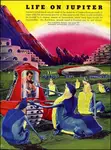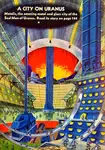ceres
[ + link to: What to see on Ceres ]
The dearth of material on this little world is unusually severe, when set against its unique importance. Nevertheless, over the years, I have managed to accumulate a few precious data on this, the largest main-belt asteroid, as an abode of life - so that, by now, I can display literary evidence of (in order of increasing importance) Ceres inhabited by human colonists, Ceres inhabited by alien colonists, and, finally and best of all, Ceres inhabited by Cereans!
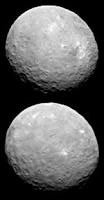
Harlei: Ceres ought to have a good page! This asteroid was after all counted as a planet - the eighth major planet - in 1801 when it was first discovered! (For that matter, Pallas, discovered the following year, was counted as the ninth. It was a few decades before the term "asteroid" or "minor planet" was brought in.)
Stid: And you're out to show that there's still something major about it. Well, this century it has been promoted - as Pluto was demoted - to "dwarf planet".
Harlei: Never mind that "dwarf planet" stuff: "largest asteroid" is what's traditional and, therefore, I'm sticking with that. What we need now are some Cerean adventures with a proper Cerean flavour.
Zendexor: Unfortunately it wasn't easy to find enough examples to please Cereophiles like you.
Here's an example of the pittance we doled out to us:
...They stepped down into the thin atmosphere of Ceres' depths. Ships of all sizes and designs rested there in the vast hollow; for this was an outlaw base for pirates of all planets. They came as they pleased, setting down for a few weeks or months, then leaving for places unknown and unasked. Not one man in a million knew of this place. Certainly the Tri-Planet Patrol didn't.
- Trail of the Astrogar
Harlei: Well, at least there's a thin atmosphere. That sounds promising...
Zendexor: Don't get your hopes up. This is the sort of thing we go on to visit:
They walked toward the single sprawling street of Ceres Base. Sounds of revelry reached them, guttural laughter and curses and the click of gambling wheels. Once they saw a thin, blue flash of an electro-pistol. That was the only law here, and life was cheap among these cutthroat pirates.
They entered a place that seemed the largest and noisiest in the town...
Stid: You needn't go on; we get the point. A space-western, no more.
Zendexor: Harlei and I don't necessarily turn up our noses at space-westerns, provided they're sufficiently flavoured with an appropriately exotic setting; but I don't think this one is.
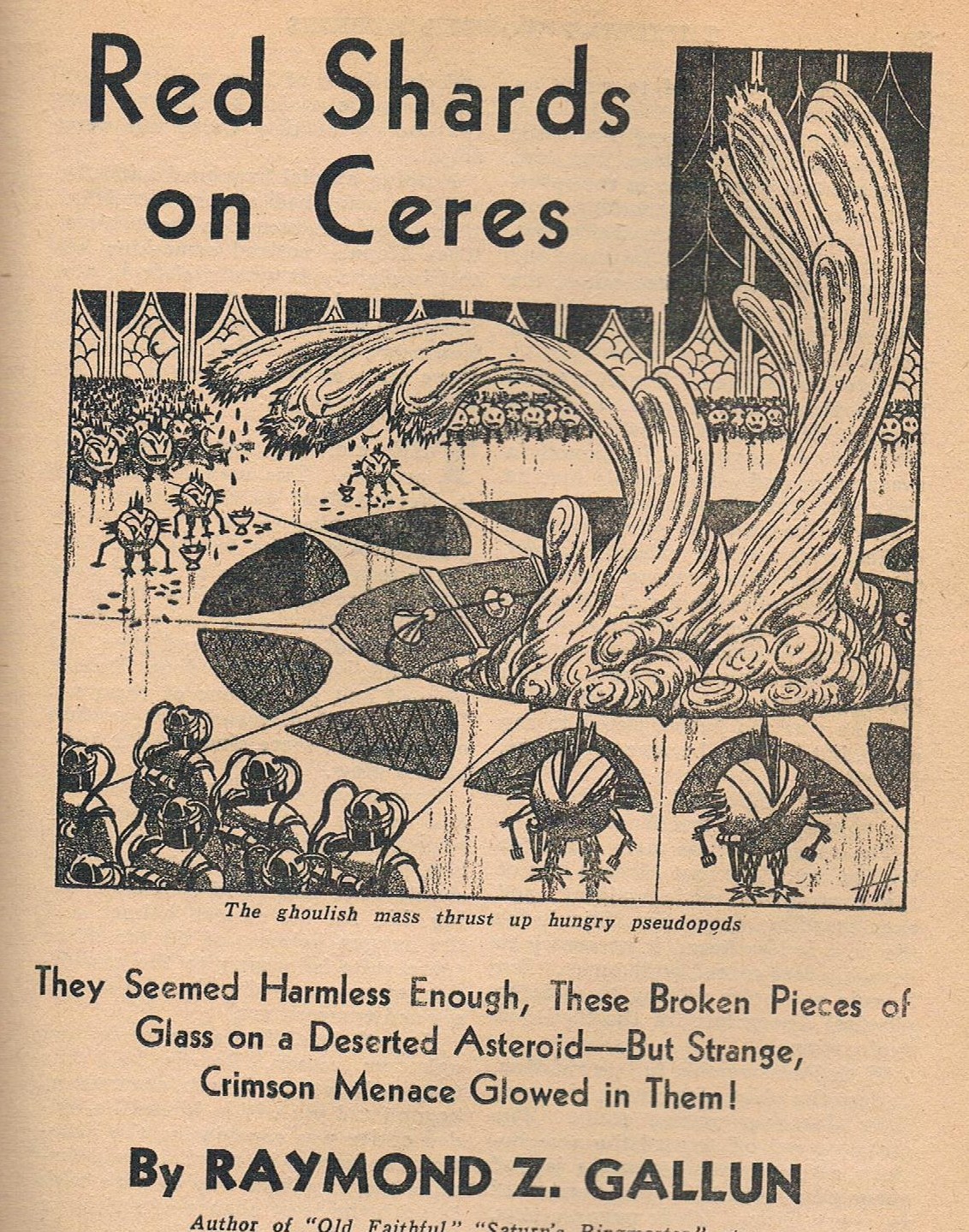
Stid: It certainly isn't, and to be frank, Zendexor, I'm surprised you started with it. It would have made a better impression if you had gone straight into discussing a Ceres story worthy of the name -
Zendexor: I wasn't holding back my conclusions just for dramatic effect. Fact is, I'm also disappointed by the tale you're brandishing at me now - Red Shards on Ceres. I'm not denying that it's good tale, that it's worth reading. Nor do I wish to spoil it.
The second portal swung inward. Brilliant light, like that of the sun, stabbed by as it moved. Automatically the members of the Farnsworth Expedition entered the tremendous cavern beyond it.
Far up toward its roof an incandescent sphere shone brilliantly, giving abundant artificial light to this strange place. The floor of the cavern was covered with odd, luxuriant vegetation, planted in orderly plots. This was farm land, then, buried within the heart of dead Ceres.
And now the men saw what manner of creatures inhabited this artificial world. From out of the shadows of spidery, grotesque trees, loaded with green fruit, came a group of furry, spheroidal monsters with thick legs and delicate, tentacular arms. Their mouths were toothless orifices in their globular bodies. Their eyes, set close to their mouths, were cruel and keen. That intelligence looked out through those orbs could not be questioned.
Each creature wore a harness decorated with fragments of the red substance which had been the undoing of the Earthmen, and odd, pistol-like weapons dangled in holsters fastened to those harnesses.
The Cereans allowed the Earthmen to advance along the road which led across the cavern floor. Then they fell in behind them, like a military escort...
Stid: Well now, this is more your cup of tea, you two - isn't it? Real Cerean aliens, real living landscape...
Zendexor: But underground, artificially hollowed out - and you know I'm not so keen on retreats from the surfaces of worlds. Detracts from them. Still, as I said before, it's a good enough story, only -
Stid: Let me guess what's bothering you. I'll quote from near the end.
"Barring violence, the master of Ceres was probably immortal; for, in spite of his wisdom, he had no complex organs to wear out. A few cells in his structure would die, but they would be replaced by the splitting of other cells.
"The entity was very old, and probably had seen much in his time. He and the lesser Cereans must have evolved on another greater planet, where their symbiotic relationship began, for Ceres is too small to have produced a native life of its own..."
Zendexor: That's it, that's the trouble - the Cereans weren't real Cereans. What a let-down.
Harlei: Hey, Zendexor, I have an idea. Let's look at it this way, let's say: "It's just Professor Farnsworth's opinion, after all. And professors can be wrong! Maybe they were real Cereans after all. Maybe the story is set in an over-skeptical age where people lack sufficient belief in the ability of worlds to breed their own forms of life."
Stid: Bravo, Harlei; looks like you've cheered him up. Enough, maybe, for him to tolerate my contribution - a rather un-native Ceres, in fact as un-native as one can get, but still, cute enough in its way -
Welcome to the "Fair of the Worlds" in The Worlds of Tomorrow.
The Fair is held on Ceres, with quarters for all the major OSS species. The magazine illustration, the map of the venue, says it all:
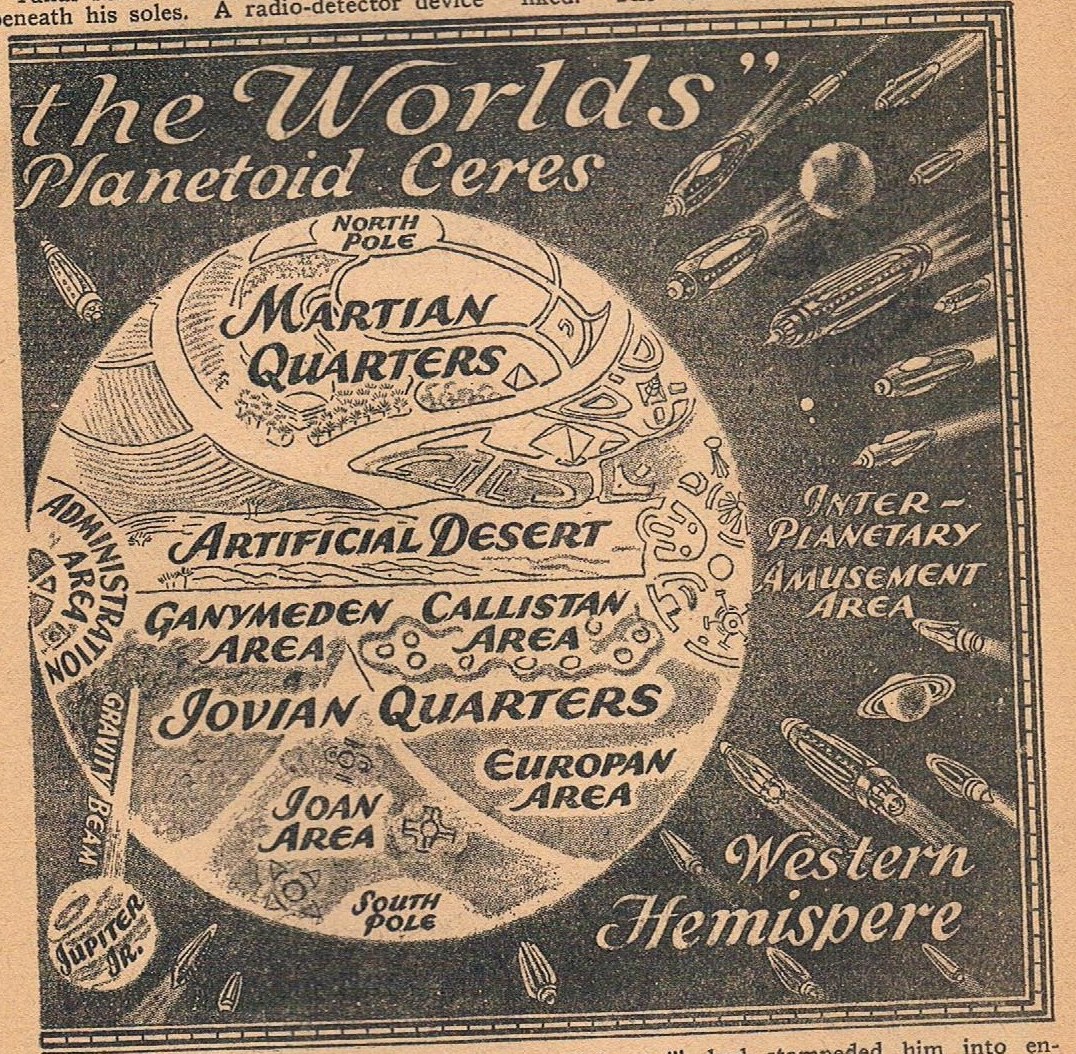
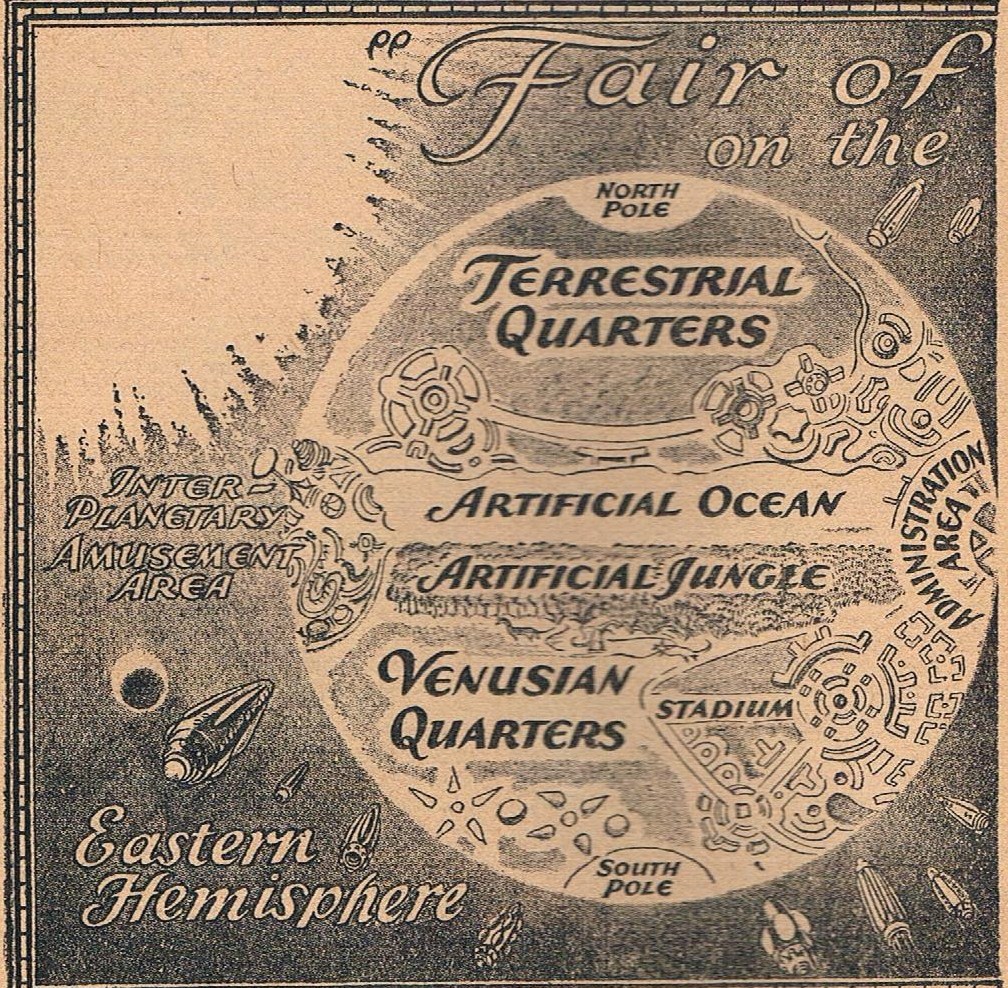
Zendexor: Very picturesque, Stid; doubtless we'd all be fascinated to visit a planetoid with such a multi-planet carnival scene. However, it's the last place in which we can hope to find a real Cerean culture. For a genuine experience of that kind I must invite the reader to focus on the only story I have found so far which gives us some possible glimpse of a native civilization on Ceres. I've kept it "up my sleeve" for the climax of this page. It's time now to introduce The Saga of Pelican West.
Bert Pellinore "Pelican" West is a spaceman who caught a plague so deadly that his shipmates dump him on the asteroid lest he infect them. Expected to die, he saves himself by eating a type of berry that turns out to be a cure.
The version of Ceres on which Pelican finds himself marooned has a thin but breathable atmosphere, and its landscape seems largely to consist of rugged scrubland.
It
was the thirty-ninth day, Earth time, since the Lady Betty's
departure. Pelican sat straddle-legged on the apex of a sixty-foot tor, the
highest piece of ground he had encountered, and surveyed the scene before
him.
Away to the brief, deeply curved horizon stretched a monotonous
landscape of dust, rocks and loam, molded into low hummocks and shallow
gullies, dotted here and there with tiny shrubs and berry-bearing bushes.
Harlei: Very promising! Just the sort of Ceres which fills me with the right kind of wonder and mystery...
Zendexor: Same here. Mystery is essential, since what we want most of all is a Cerean civilization, but we naturally feel that it can't be too obvious, else it would already have been discovered. On the other hand we also hope that it isn't hidden underground, since that would deprive the civilization of a landscaped setting. I'll tell you right now, Russell does give us, or at any rate hint to us, that we're going to get what we want. How, then, we ask ourselves, shall it be found? What form will it take?
I need to warn the reader that the story isn't mainly about the Cereans. Most of it consists of a struggle for survival between, on the one hand, Pelican, teamed up with a woman he rescues, plus his snaky Callistrian pet Alfred, and, on the other hand, a shipload of pirates. I won't go into the details as I am not greatly interested in that sort of conflict. But on the way to the denouement, Pelican and his companions do encounter some wonderful hints of a uniquely presented native civilization.
Gray fingers of dawn sneaked
through purplish skies and heralded
the third day's march. Jupiter and his satellites sank slowly in the west; an
anemic Sun thrust its rim above the east horizon. Pelican nudged Eve into
wakefulness and handed her a steaming water bottle.
"E-e-eugh!" She yawned widely, and blinked at the bottle.
"What's
this?"
"Hooligan's coffee."
"How'd you make it?"
"I plunked a dozen berries in the water and brought them to a boil
with a dose of heat ray at ten-percent intensity."
She sipped, made a wry face and sipped again. Pelican busied
himself collecting equipment in readiness for departure. Eve finished her
drink and looked around.
"Where's the snake?"
"Gone looking for shrews, probably. There are plenty of them
about; you can see their burrows all over the place. Half a dozen in his
stomach and Alfred's a he-man for the rest of the day."
Casually, Pelican strapped his holster around his waist, filled the
bottle at a pool, and slung the yet unused air gun over one shoulder. Eve
came to her feet as Alfred slithered into view. With one last look at their
camping place, the trio struck out northeast.
For one hour they trekked steadily across the switchback terrain.
Bushes grew more profusely, but still the landscape remained as
monotonous as ever, betraying no sign of anything so alien as a rocket ship.
They crossed a crest and passed down the farther slope into a valley deeper
than any they had encountered. Eve hesitated, then stopped as they reached
the bottom. She looked at Pelican anxiously.
"It's queer, but I've had the strangest feelings for the last twenty
minutes."
"I've had 'em many a time," Pelican assured her. "It's the thin
air."
"No, not that." She stared around vaguely. "I'm perfectly sane,
yet
I've been feeling as if some one has been trying to explain to me things I
can't hope to understand."
"A touch of nervous trouble," suggested Pelican.
"Maybe. But it's stronger than ever—and altered somehow since
we arrived here."
"How does it feel now?"
"For all the world as if I was blind and deaf and was standing in the
center of New York while a patient but defeated guide tried to make me
understand what was about me."
"Since you've described it so exactly, I'll admit I've been having the
same ideas myself." Pelican looked a little uneasy.
"Let's get out of here quickly. I'm afraid of spooky places like
this."
..............
They hastened up the opposite slope and crossed another twenty
valleys before Eve had recovered confidence enough to discuss the matter.
"That sensation was too strong to be a delusion. It was something
supernatural."
"Bosh!" scoffed Pelican. "Things aren't supernatural merely
because we can't find an explanation for them."
"Can you imagine any explanation?" she challenged.
"Let's suppose this world harbors a mighty civilization that is all
around us, and—"
"Nonsense," Eve interrupted. "Your own five senses tell you that
isn't the case."
"Are my five senses sufficient?"
"Well—well—" She looked confused.
"Suppose that life here, if any, and whatever it may be, has evolved
only four senses, three, or all, of which are totally different from ours. And
suppose their forms have a construction that doesn't register on our senses,
while our forms make little appeal to their senses. Could either of us
comprehend each other?"
"Imperfectly, at least," she conceded.
"Could you describe a color to a man blind from birth?"
"No," she admitted.
"Can you explain to a Martian what your nose is for and how it can
smell?"
"No. I've tried, and it's hopeless. Has a Marian ever succeeded in
explaining to you what it means to poldek?"
"A Martian can't explain it because no Terrestrial has been born
with the ability to poldek. All I've been able to gather is that it's a sort of
sense that enables them to perceive life, a faculty by which they can tell,
with ease, where life is and whether or not anything contains life. But how
they do it beats me completely."
"I don't like to think there might be things I can't see hanging
around us. It's much more comfortable to—" She broke off in mid-sentence,
gasped and said, "Did you see that?"
"What?"
"Something like the wall of an immense building. The light caught
it. It was shadowy and unsubstantial and seemed to turn past us as we
walked through it."
"You're dream— Hells bells!" He snatched Eve by one arm,
dragged her aside. Together they stared at a wavering, watery vision of a
monster wheel, with helical-cut gears, sliding past on their left. It vanished
abruptly, leaving a vaguer impression of a multitude of shafts spinning
madly at greater heights.
"Like delirium tremens in an auto
factory," said Pelican. "Come on,
let's put our best foot forward. We're suffering from too little bread and too
many berries."
Stid: Well, is that it?
Zendexor: Yes, that's it. Beyond this point they get attacked by the pirates again and we have no more on the Cereans. But it was a fascinating glimpse... the best of its kind that I've found so far.
Raymond Z Gallun, "Red Shards on Ceres" (Thrilling Wonder Stories, December 1937); Henry Hasse, "Trail of the Astrogar" (Amazing Stories, October 1947); Eric Frank Russell, "The Saga of Pelican West" (Astounding, February 1937); Manly Wade Wellman, "The Worlds of Tomorrow" (Thrilling Wonder Stories, October 1940)
See Sidelight on Ceres for scenes in The Ship From Infinity by Edmond Hamilton, plus some thoughts on whence the planetoid derives its literary power.
See the Diary entry, Orbital Preservation Order, for a scheme to move Ceres to turn it into a moon of Venus.
For musings on a magnificent NASA video see Flight Over Ceres.
See the Diary entry Unlucky Cerean Giants for the references in Garrett P Serviss' Edison's Conquest of Mars.
For evolution on airless Ceres see At home in vacuum: the space-dogs of Ceres.
>> other asteroidal pages: Peril on Pallas - What to see on Pallas - Chill on Beautiful Iskar - What to see on Eros - What to see on Icarus - What to see on Vesta



























